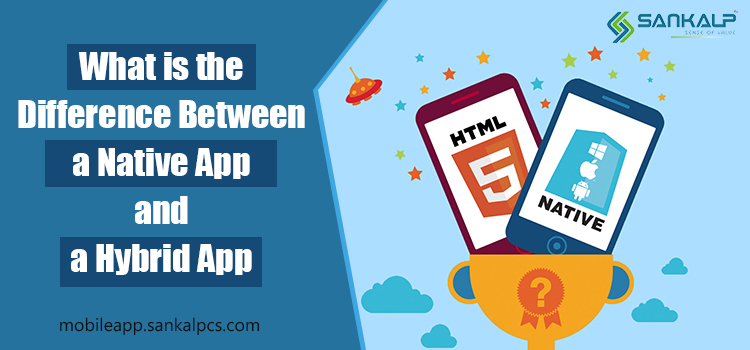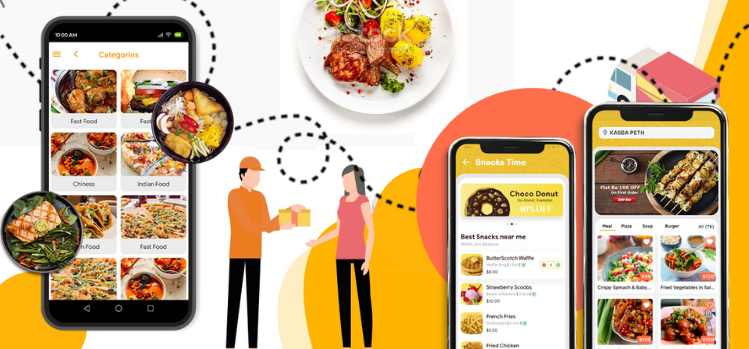The era in which we are living is already a mobile-first world. As per Statista, the trend that began in 2017 has continued, and today more than 50% of internet traffic comes from mobile phones.
Going for the mobile app is a wise decision, but when the companies decide to go for mobile app development, the biggest dilemma they face is the app development technology they should opt for – native app and a hybrid app? It depends on the company’s specific needs of the company – the niche company would be catering to the budget and urgency of the mobile app development, among others.

To make your task easier, we will explain the difference between a native app and a hybrid app. Let’s get started.
Native Apps
Native apps are developed for specific devices like android and iOS. This means the android app that is available on Google Play will not work on the iPhone. Similarly, an iOS app can only be downloaded from the App Store and is compatible with an iPhone.
Android apps are coded in Java, while iOS apps are coded in Objective-C. The most significant benefits of the native apps include their reliability, excellent user experience, sync with the hardware flawlessly, and operating features of mobile devices such as the microphone, camera, and speakers. Simultaneously, they have some inherent disadvantages like they need to be developed for individual platforms viz. android and iOS separately, which means higher development costs. Moreover, native apps cannot be auto-updated at the user’s end. That is, the publisher will need to release updated versions of their apps, and users would be required to update them every time.
Hybrid Apps
As enumerated above, the hybrid apps use elements of both native and web apps. One, these are available on the play stores. Most big corporations have both native as well as hybrid apps on the play store. The hybrid apps are usually the lite versions of their native counterparts. Example – Messenger lite, Facebook lite, Twitter lite. Hybrid apps are typically more accessible and faster to develop than native apps, and they need less maintenance.
The most significant advantage of hybrid apps is that they can be built on a single base, which allows the publisher to add new functionalities to multiple versions of the app. Whereas, with native apps, you will need to replicate every new feature you want to introduce for each platform separately i.e., for iOS and android platforms.
Read also: How Hybrid Mobile Apps Can Take Your Business To The Next Level?
Since Hybrid App development is in fashion, it is essential to highlight the features. Here is the summary of the benefits of hybrid app development:
Since hybrid app development is all the rage, it’s essential to highlight the features.
Which is better, native apps or hybrid apps?
Here is the summary of the benefits of hybrid application development:
1. Low cost with ease of development:
Due to the unified development of hybrid mobile applications, companies will not have to spend separately to create multiple versions of apps for various platforms.
2. Native experience with simple backend:
Hybrid app users experience a seamless and seamless native feel as they switch from one device platform to another.
3. Creative ideas reach the target audience:
Hybrid apps are elegant and sophisticated; They cleverly combine the device’s operating system with its inherent functionality without too much overhead. This allows application developers to develop more creative ideas to do more with hybrid app development and capture a great deal of attention from the target audience.
4. High-speed performance:
Practically, when compared to other mobile development options, hybrid applications are significantly faster than mobile web applications. Twitter is an example of how hybrid app development epitomizes performance.
5. Attractive UI / UX designs:
Consistent experience and attractive design are two core elements that attract more users to your app. With hybrid app development, you can be sure that your mobile app offers a superior user interface experience and flawless performance for your app users. This makes it a preferable option for businesses looking for maximum engagement from iOS and Android device users.
6. Offline support:
Probably, the most significant advantage of the hybrid app is that they support offline support. Offline support keeps users connected to some of their application functions even when they lose connection to the network. In hybrid applications, due to the device API, users can store specific data locally as offline storage, which is useful for those in transit or those who frequently lose coverage.
7. Seamless integration with other applications:
Unlike native apps, hybrid apps can seamlessly integrate with other apps, which is a massive advantage for hybrid mobile app developers who would put little effort into integration. Additionally, since hybrid mobile apps effortlessly connect to the device’s system environment, just like native app operations, users will not experience the slightest friction when using hybrid apps.
8. Qualified for the online market:
Google Play and the Apple Store follow strict guidelines for the type of application that can be published in their stores. It is always good to have applications ratified by these two giants and qualified to be available in the respective online stores.
Time to Make a Choice
With competition flourishing in the digital marketplace every day, it is crucial to take advantage of the process that offers higher speed and lower cost of mobile application development. Hybrid mobile apps solve the problem of targeting each platform with separate native apps and help find the fastest niche in the online app store market.
Additionally, hybrid apps have a built-in backend and some native app features, combining the best of both. Therefore, companies that want to remain unmatched can choose hybrid mobile app development and grow exponentially.
Interested in getting your hybrid mobile app? Get in touch with the best in the business! Sankalp is one of the highest-rated software and mobile app development companies in India, having clients in over 50 countries worldwide across six continents.
At Sankalp, we can help you choose the right app, whether native or hybrid, for your idea. Sankalp is among very few CMMI Level 3 Certified and ISO Certified companies in India that ticks all the right boxes.
Get in touch with the specialist team click here.







Add comment